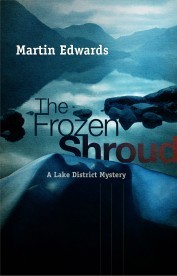Editing a Novel - and The Frozen Shroud

The Frozen Shroud, the sixth Lake District Mystery, concerns three murders, each committed on Hallowe'en, over the space of one hundred years. It therefore appealed to me to submit the final typescript to my American publishers and agent at around midnight on...yes, Hallowe'en. What I hadn't bargained for was the speed and efficiency with which my editor, Barbara Peters of The Poisoned Pen Press, would edit the manuscript. It was back with me inside 48 hours, which was quite remarkable. So I spent the past week-end going through the edits as I seek to finalise the manuscript for publication next year.
This prompts me to make a few observations about the editing process, and the relationship between author and editor. It's a hugely important relationship, I think. I've been lucky, over the years, to have had some very good editors (they include David Shelley, whose idea it was that I write a new series with a rural setting, and is now editing J.K. Rowling, no less). Barbara is outstanding, not least because she combines experience, insight and love of the genre with a sympathy for what one is trying to do and also with a willingness to tackle aspects of a manuscript that don't seem, to her, to work. It's this robustness of approach, coupled with empathy for the writer's work, that separates the best editors from the rest.
One reason why the final editing process was so quick and painless was that I'd submitted a segment of the first draft to Barbara some months ago. She liked it (in fact, at the time, she and my agent liked the book more than I did - I was going through the sort of crisis of confidence that afflicts many authors mid-way through a first draft) but she did raise a few issues. All but one of these was easy to deal with. The remaining issue was also fairly easy to deal with, but more significant, because in changing what I had written, I came up with a brand new idea which helped me to reconfigure the sub-plot of the book in a way which, I felt, worked much better than the original. This really gave me a big morale boost, as a part of the story that had proved worrisome suddenly became satisfying to me and, I hope, to future readers.
This is what the editorial process can do for a writer, and a book. It's for the writer, not the editor, to write the book, but an editor's wisdom can be invaluable. Because I never feel confident about my first drafts, especially when they are incomplete, I'm always a bit reluctant to share them, but Barbara's input had consequences for the reconstruction of the story that she possibly didn't anticipate. Her comment on one relatively minor issue sparked my imagination, and gave me, and the narrative, fresh impetus. There are some aspects of this particular novel that are quite ambitious, and for a long time I wasn't sure they were going to work. Thanks in no small measure to a terrific editorial relationship, I'm now looking forward to the publication of the book with an eagerness that, back in summer, I wouldn't have thought possible..
Published on November 05, 2012 05:47
No comments have been added yet.



